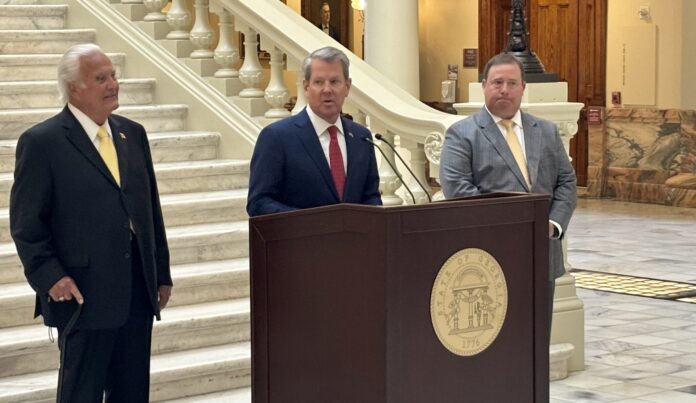
(Georgia Recorder) — Republican Gov. Brian Kemp and state regulators hailed on Wednesday Georgia Power’s tentative agreement to freeze base rates for the next three years as a symbol of the state’s economic growth.
Some clean energy advocates dismissed the timing of the Republican governor’s Wednesday press conference as an effort to shore up support for two sitting GOP Georgia Public Service Commission members before they face voters on this year’s ballot.
On Monday, Georgia Power and the PSC staff reached an agreement for the company to “freeze” its base electric rates from 2026 to 2028.
The PSC is scheduled to hold hearings on the agreement in June that, if approved by the commission, would eliminate the need for this year’s planned rate case, which normally occurs every three years.
Critics say that despite the rate “freeze,” Georgia Power customers will still see their utility bills go up as hundreds of millions of dollars from storm damage and fuel recovery expenses are approved.
RELATED PSC primary June 17
On Wednesday, Kemp credited lower electricity bills with the state attracting 193,000 jobs and $90 billion in industrial investments since 2019.
“We are freezing (rates) because of smart choices by our utilities and buyers, the people you see here beside me today and many other leaders around the state,” Kemp said while flanked Wednesday by PSC Chairman Jason Shaw and Commissioner Lauren “Bubba” McDonald, who are not up for re-election this year. “Our rates are stable even in the midst of unprecedented growth because we have a strong, reliable energy grid and strong partners in both private and public sectors.
“Coupled with the falling gas prices, this rate freeze will help Georgia families in the time they needed it most — after historic inflation and storms that challenged many people’s day-to-day lives,” Kemp said.
This week’s announcement is ahead of the early voting period that starts this coming Tuesday for the June 17 primary election for the two commission seats on the ballot this year. The winners will go on to compete in the Nov. 4 general election.
Republican incumbents Tim Echols and Fitz Johnson are facing challengers seeking to upset their bids to remain on the board.
Echols, who is seeking his third term on the PSC, will face challenger Lee Muns in the Republican primary for the commission’s District 2 seat. Whoever wins will face Alicia Johnson of Savannah, the sole Democrat in that race.
A large field of candidates qualified to run for the metro and suburban Atlanta area district represented by Johnson, who is seeking re-election after being appointed by Kemp to fill a vacancy in 2021.
One of the Democratic candidates is Daniel Blackman, who served as a regional administrator for the Environmental Protection Agency under President Joe Biden, and forced a run-off against McDonald in the 2020 PSC election.
Brionte McCorkle, the executive director of Georgia Conservation Voters, said the “freeze” will help Georgia Power ratepayers but said she suspects the agreement and Wednesday’s press conference is a political move to avoid voter backlash during an election year.
She accuses the five-member commission of having a history of favoring Georgia Power’s “irresponsible investments in fossil fuels” and ignoring public calls for renewable energy.
“Don’t get me wrong, I’m excited that there is a pause to the relentless rate increases that Georgians have experienced for the past several years,” McCorkle said. “But make no mistake, this is definitely an attempt to kick the rate increase down the road when there’s not two important elections on the ballot.”
During the June hearing, expert witnesses for Georgia Power and PSC staff will present evidence and testimony and be cross examined by consumer and clean energy watchdogs, environmental groups, industrial customers and others.
Commissioners are set to take a final vote on the new agreement on July 1.
Environmental groups said they’d like to get more information about the negotiated agreement that comes after a series of hikes since the start of 2023. Since then the average Georgia Power residential customer is paying about $43 more to cover base electric rate increases, excess fuel expenses, storm costs and the completion of two nuclear power generators at the Plant Vogtle.
“What this agreement does is it says the only rate increases that will happen, other than fuel costs that could go up and down in the next couple of years, will be to the base rate for storm costs,” Whitfield said.
Shaw emphasized the role of reliable utilities and his own commission in maintaining low energy costs.
Shaw denied the agreement was announced in order to ease criticism of board members while on the campaign trail this year.
Kemp defended the Public Service Commission’s handling of complex utility cases and said it’s ironic that there are complaints about base electric rates being paused for three years.
“I think this is good news to sell to our state,” Kemp said. “The time, to me, doesn’t matter. We’re talking about an upcoming primary election for down ballot offices that will have to be decided in November. We’re not basing our calendars around here on what political elections are coming up.”
Georgia Power and PSC officials say that the company’s fuel and storm damage costs aren’t profit based, but instead intended to cover fuel cost overruns and money spent responding to natural disasters such as last year’s Hurricane Helene.
Georgia Power was expected to include storm damage assessments as part of its 2025 rate case. Instead, Georgia Power is currently undergoing an audit of storm-related costs and is set to file for recovery expenses in 2026.
“This stipulated agreement helps balance the affordability needs of our customers while ensuring Georgia Power remains equipped to continue its support of our state’s incredible growth – which is good for all of our stakeholders,” Georgia Power spokesman John Kraft said in a statement.
Georgia Power projects that over the next decade the growth of data centers will significantly increase the state’s electricity consumption. The proliferation of data centers has become a source of consternation for a number of consumer and environmental watchdogs.
But on Wednesday, Shaw credited the rate case deal agreement with another agreement this year in which Georgia Power agreed not to pass down costs to serve data centers and other large manufacturers onto other customers.
“Part of the reason we’re able to stand here today, in my opinion, is because we’re able to do things that other states weren’t able to do,” Shaw said. “We’re able to show that the revenue from these large load customers is indeed putting downward pressure on rates for others.”






